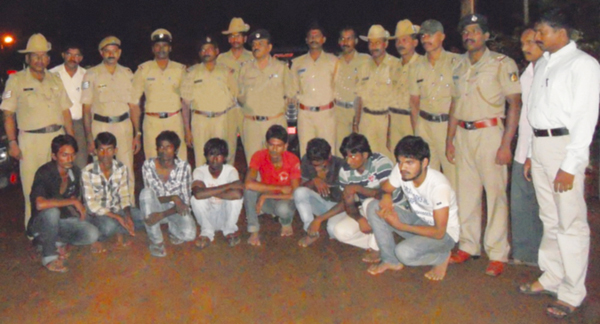
Bhatkal, June 28: In a joint operation Bhatkal and Honnavar police on Wednesday arrested an inter-State dacoits gang in Manki police station limits. The police arrested eight persons. Kumar Guru, kingpin of the gang, had escaped, it is said.
According to M. Narayana, Deputy Superintendent of Police, the arrested persons were dreaded criminals with more than five cases were filed against them in Andhra Pradesh and Karnataka. The arrested persons had belonged to as Hamza gang and Suresh kumar gang. They were identified as Hasanabba, Narendra Babu, Manikantha, Raghavendra, Ramanjaneyalu, Salim, Vamshi, and Suresh Kumar.
According to police, these thugs were planning to loot the lorries passing on the highway carrying valuable materials. The police suspect that the gang was planning to halt the lorries and kill the drivers and escape with the vehicles bearing valuable things.
Such kind of incident was reported from Yellapur, a few months back where two lorry drivers were reportedly murdered. Police suspect that even this gang was planning for the same kind of actions.
Mr. Narayana said they were facing criminal charges of dacoity and other heinous crimes in Ananthpur in Andhra Pradesh and in Brucepet Police Station limit in Bellary. The police have seized weapons from them.
Under the guidance of Uttara Kannada SP Mr. K T Balakrishna, and the directions of Bhatkal DySP Mr. M Narayan, the Honnavar CPI Mr. Pramod Rao, Bhatkal CPI Mr. Shiv Prakash, Manki PSI Mr. P B Kannur were successful in their mission of arresting the dacoits.
All the accused were presented before the Honnavar court on Wednesday night and were later taken to the police custody. Police are further investigating the case.





Comments
Add new comment